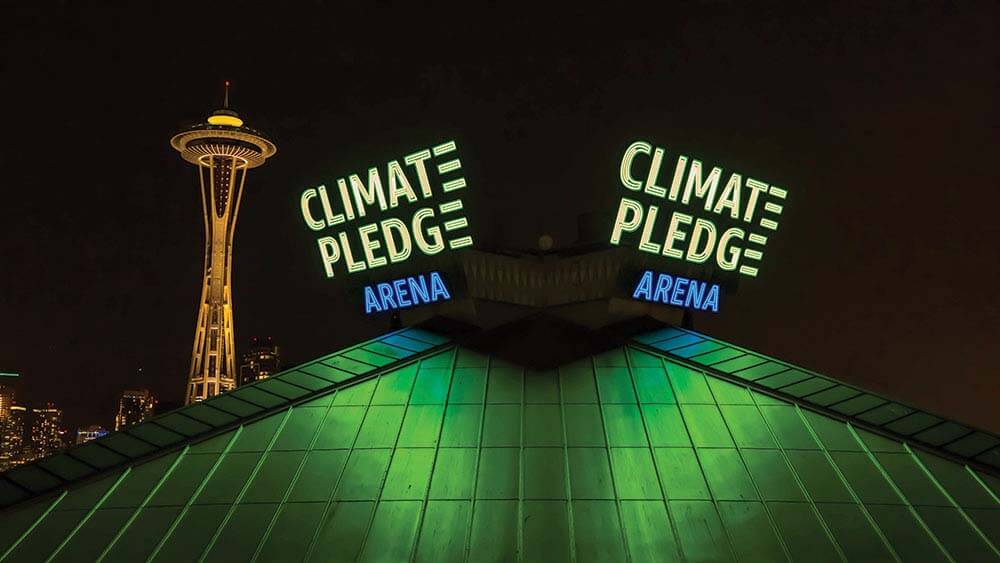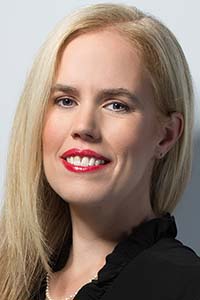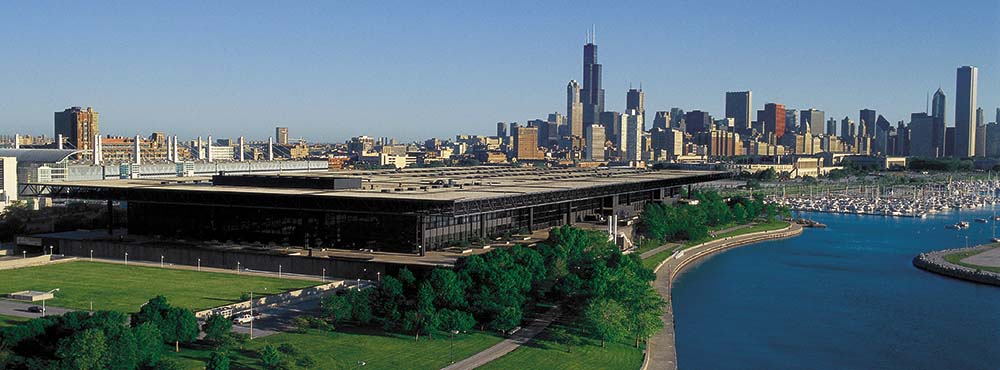
Instead of advertising its brand, Amazon chose to use its naming rights to spotlight its pledge to reach net-zero carbon emissions by calling the Seattle venue Climate Pledge Arena — just one example how sustainability has become top of mind for organizations and consumers. (Michael Dyerland/Visit Seattle)
The Climate Pledge Arena, a sports and entertainment venue that opened last October in Seattle, is a showcase for sustainable innovation and best practices, from the top of its solar-power-generating roof down to its hockey rink’s “green” ice made from harvested rainwater and maintained by an electric-powered Zamboni.
But one of the most striking features at the new center is what’s spelled out in its name: The venue is on track to be certified as a net-zero carbon events venue, which means that its day- to-day energy comes entirely from renewable energy sources. Instead of advertising its own products, Amazon is using the naming rights it secured for the stadium to honor a pledge it made in 2019 to reach net-zero carbon emissions as a company by 2040.
That choice reflects what feels like a tipping point, by both businesses and consumers, in their commitment to sustainability, a shift that’s been spurred on by the pandemic. In March of 2021, when IBM Institute for Business Value surveyed global consumers, two out of three respondents said environmental issues are “extremely” or “very” important to them personally, and 93 percent said that COVID-19 influenced their views on sustainability.
RELATED: Do Conference Attendees Really Need More Bags and Water Bottles?
Convention center owners and operators are paying attention. “We need to act urgently, as operators and as humans, to make a difference in what is arguably the biggest fight of our lives,” Chris Granger, president of OVG360, said last March as he announced a new sustainability plat- form that would help 240-plus venues operated by the company — including Climate Pledge Arena and 58 convention centers — better measure their environmental impact.
Here are three ways in which industry sustainability experts told us that event sustainability isn’t business as usual in 2022.

“I think we are in a situation where the events sector is becoming more cognizant of vulnerabilities that we have.” — Shawna McKinley
1. Collaborative relationships are creating a new kind of sustainability infrastructure. Over the last three years, organizations have seen and felt the benefits of sharing and leveraging knowledge as they leaned on each other to help overcome the challenges of the pandemic — a phenomenon that happened both within networks and in individual venues. The stress of the pandemic and other global crises like climate change, “does cause organizations to band together,” said Shawna McKinley, principal at Clear Current Consulting, and an instructor in topics including sustainability, corporate social responsibility, and event industry ethics at the British Columbia Institute of Technology. In the context of sustainability, she told Convene, “there’s efficiency in sharing lessons learned and working with organizations that can better facilitate things like measurement and sharing best practices.”
In August, ASM Global announced that it will partner with Honeycomb Strategies, a sustainability consulting firm (PCMA also is a client), to help lead its sustainability strategies. One goal is to help the company respond, ASM Global President & CEO Ron Bension said in a press release, to the “demand for cutting-edge sustainability innovations.” The partnership will include opportunities for center operations staff to learn from one another and to coordinate their strategies, which will help venues to track their progress, said Honeycomb Strategies Principal Lindsay Arell. Similarly, the OVG360’s sustainability platform — called GOAL, which stands for Green Operations & Advanced Leadership — will include a forum to allow convention managers and staff to collaborate with other “like-minded operators, vendors, and sponsors who are committed to operating more sustainably,” according to OVG360. The platform also will give members digital tools to track their performance against standards for energy and water use, greenhouse gas emissions, indoor air quality, and other measures.

“Don’t be afraid to insist on what you want — you shouldn’t be ‘green-gouged.’” — Doug Bradley
Convention center staff also have been working through the pandemic to create new resources for clients at the individual venue level. In Chicago, at McCormick Place, convention center operations and sales staff created new tools to better communicate their sustainability capacities to clients early in the meeting process, said Doug Bradley, vice president at SAVOR, the center’s F&B provider. When it comes to food and beverage, the earlier that planners have a conversation about sustainability, Bradley said, the better.
Bradley asks to hear exactly what planners want in terms of sustainable sources, he said. “Don’t be afraid to insist on what you want — you shouldn’t be ‘green-gouged,’” he said. His team can control costs, while making sure that planners’ requests about sourcing food locally or donating leftover food are met, he said. “But it takes time and planning.”
The sales teams at convention centers haven’t always been well-versed in a center’s sustainability capacities but providing more direct access to sustainability and operations staff early in the meeting planning process is “an area where a lot of convention centers can improve,” said Amanda Simons, the other principal at Honeycomb. “More and more convention centers are hiring folks who are focused on sustainability or they’re recognizing that their operations people have that skill set.”
Venues are in many cases dependent on planners to help them reach their sustainability goals, Arell said. “I see a lot more partnership and collaboration happening.”

At McCormick Place in Chicago, staff members have created new tools to better communicate the center’s sustainability capacities to clients early in the meeting process.
2. Paying attention to sustainability is a risk-management issue. Taking a pass on thinking about sustainability isn’t really an option anymore for meeting professionals who organize events, Arell said. “There’s just too much news and too much stuff going on in the world now around climate change and the impacts on communities of waste and plastics to ignore [sustainability],” she said. “Frankly,” Simons said, having a sustainability plan and communicating about it “has become a risk-management issue.”

“I see a lot more partnership and collaboration happening.” — Lindsay Arell
A “huge rise in social consciousness around the severity of the climate crisis” occurred just prior to and during the pandemic, McKinley said. “One of the things that I think has shifted is that we’re coming back to a world where people are questioning activities that are carbon intensive. And I think we are in a situation where the events sector is becoming more cognizant of vulnerabilities that we have.”
The fact that failures or gaps in sustainability easily can be amplified on social media also increases reputational risk, McKinley said. “One thing can be missed, and then that becomes the story,” she said. The lapses can seem small, and event planners may have cared deeply and been attentive to detail, “but they indicate a value that then gets blown up on social media.”
The intensified focus on sustainability is coming not just from individuals, but from corporations. Honeycomb consulted on an event that had a sustainability plan in place but had yet to update it on the event website. The organization began getting emails from potential registrants who said they were not allowed to register for the event until they had a better understanding of the event’s sustainability practices, Simons said. Their company was requiring them to report on event sustainability guidelines “because that fed into that corporation’s sustainability strategy,” she said, which included a policy that employees weren’t allowed to attend events lacking in adequate sustainability practices.
Communication with attendees about an event’s sustainability has become a “humongous” part of a successful sustainability strategy, Simons said. “I think a lot of times planners get weirded out about sending out too many emails,” she said, but this isn’t the place to skimp on providing information.
3. Conversations about measurements and impacts will be more important. Venues that routinely generate post-event reports that calculate the environmental impact of events are still the exception rather the rule — but that is changing. Hundreds of meeting industry stakeholders, including dozens of convention centers around the world, have signed on to the Net Zero Carbon Events Pledge, which was announced last October at COP26, the United Nations climate conference held at the Scottish Event Campus (SEC) in Glasgow, Scotland. By signing the pledge, organizations are making a commitment to set sustainability targets and to hold themselves accountable to them.

“Our stance is always: This is a journey; this is not a destination. And you don’t just start and you’re perfect.’ — Amanda Simons
One of the most important things that a meeting planner interested in sustainability can do is to ask a venue for a post-event metrics report, Arell said. That will automatically trigger the venue to understand that “Oh, these guys care about sustainability. What else are they doing? How can we help them? Then we can begin offering ideas or brainstorming ideas to them around that,” she said.
Some organizations — especially their marketing departments — worry about reporting the results when they miss their targets, Simons said. But what’s more important, she said, is to report transparently. “I don’t think people really expect perfection,” she said. “What they would be more mad about, frankly, is greenwashing — when [an event producer] says, ‘I’m doing all this stuff,’ and then I go to the show and that’s not what’s happening. Our stance is always: This is a journey; this is not a destination. And you don’t just start and you’re perfect.
“There are so many factors that contribute to what makes you quote, unquote ‘successful’ and so many different standards, right?
“You could address waste, or you could address carbon. And there are so many different ways to reach those goals. And sometimes you’re going to get closer in some city than you are in another city because of infrastructure. But if everyone starts looking at the same key impact areas and starts reporting in the same ways, we can compare results, year over year, apples to apples.”
Barbara Palmer is deputy editor of Convene.
On the Web
- To learn more about the Net Zero Carbon Events pledge and view its more than 270 signatories and more than 130 other supporters, visit netzerocarbonevents.org.
- To learn more about Climate Pledge Arena’s sustainability goals, visit climatepledgearena.com/sustainability.
Learn and Earn
Earn one clock hour of certification by visiting the Convene CMP Series page to answer questions about this story and the stories listed below.
- “Monterey Bay Aquarium’s Sustainability Efforts Cause Ripple Effect”
- “Can We Finally Kill Off Cheap Conference Swag?” from Fast Company
The Certified Meeting Professional (CMP) is a registered trademark of the Events Industry Council.
